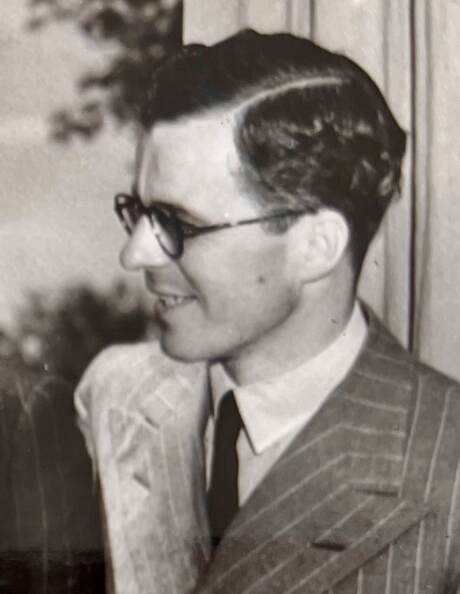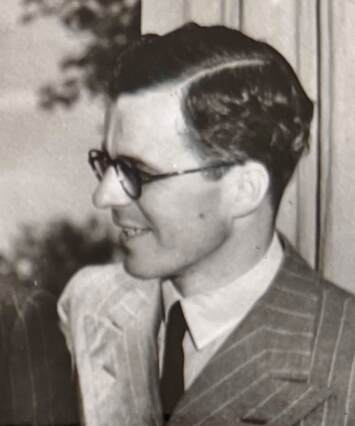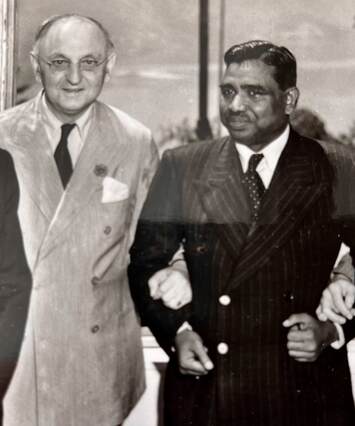David Watson was a medical doctor who during his student years at Aberdeen University in the late 1920s attended a “House Party”, the name given to early Oxford Group residential gatherings, at Dunblane, Perthshire. He had been invited by students he knew who had become interested in Frank Buchman’s effective work.
The challenge he met there made him realise that if he wanted to see the world different, he needed to start with himself. He held a deep feeling of bitterness towards his father, a well known Aberdeen businessman, whose alcoholism was affecting his wife and family life. He made peace with his father, apologising for his hostility. This freed him and was the start of a new life.
The challenge he met there made him realise that if he wanted to see the world different, he needed to start with himself. He held a deep feeling of bitterness towards his father, a well known Aberdeen businessman, whose alcoholism was affecting his wife and family life. He made peace with his father, apologising for his hostility. This freed him and was the start of a new life.
When he graduated with his medical degree, his first job was as a ship’s doctor on a vessel in the South China Sea. The gifts he brought back for his family still grace their homes and the game of Mah Jongg became a favourite and still enjoyed by the next generation. He was an adventurous young man who loved fishing with the gamekeeper in the waters of the Clunie burn near Braemar. And later, on one of his visits to Scotland walked the Lairig Grhu from Deeside to Spey side with a small party including his eldest niece, Alison Porter.
He moved to London and added the Diploma of Mental Health to his medical qualifications, and there he associated closely with the Oxford Group people in London, and in fact stayed in the Pugh family home.
As did most of his generation, he was called to active service into the Royal Army Medical Corps and served as a doctor in the Indian Army, mainly in Burma and would write home to the children of his sister that he had just awakened and looked out of his tent onto a great sea of Cadbury’s Milk Chocolate, the best description he could think of for the banks of the Irrawaddy River in the monsoon season. While there, he became good friends with his commander who was a very practical Christian and would join him at his Saturday morning prayer meetings. As well as being a medical doctor to the men in the unit, he would seek the Almighty’s help in how his patients could find direction for their lives. To one young Englishman, a professing Christian who came to see him about his sore throat, he told him that God had a plan for his life which led to a far deeper experience than treating only the sore throat. His patient did find the change that he needed to address and acted on what he was carrying on his conscience and so his life began on a new path. After the war the man became one of the many volunteers who worked with MRA and was a colleague of David’s.
When war ended, he had the call to return to and spend the coming years serving the subcontinent, giving time to India, Burma, Pakistan and Ceylon, where he continued the friendships he had made during the war years, with a group of other men who shared his commitment. By this time some of these men were in the newly formed government of India following partition from Pakistan. He, with Roger Hicks, stayed in the home of Gulzariral Nanda, the Home Minister, while he was working on India’s Five Year Plan. They would walk with their host in the cool early morning hours sharing their thoughts they believed came from the Almighty to support Mr Nanda in this vital planning for the nation’s future. In 1953 the weekly newspaper in David’s native Aberdeen described his work under the title “An Aberdeen Doctor’s Pioneer Work In India”, showing him aiding Dr Frank Buchman in laying a wreath on the plain stone slab marking where Mahatma Gandhi was cremated in Delhi. Dr Buchman was a friend of Gandhi. For a period of time David was Dr Buchman’s personal physician, including a campaign tour of India with an international team of 200 which presented theatrical performances to inspire the audiences, illustrating the ideas, the message of MRA. The Aberdeen newspaper went on to say that this visit of Dr Buchman and his team made a profound impression upon all sections of Indian national life and thought.
Sadly in 1966, a brain tumour brought the end to David’s life at the age of 57. To quote the obituary for him in the British Medical Journal, “As full-back in his University rugby team he showed the qualities which were to endear him to so many throughout his career. Resourcefulness in defence, precision and initiative in inspiring attack, characterised his whole philosophy of life... Watson will be remembered most for his insight into the character and motives of both friends and patients. He saw behind events to what made people and nations take their various policies. He explained them to themselves and thus inspired them to make constructive decisions. He believed that medicine had a mighty role to play in shaping the future of civilisation, uniting nations and people of whatever colour or class. Believing that caring, sympathy and understanding created unity and built character, He thus related the simple, kindly acts performed in daily duty to the needs of the world”.
As did most of his generation, he was called to active service into the Royal Army Medical Corps and served as a doctor in the Indian Army, mainly in Burma and would write home to the children of his sister that he had just awakened and looked out of his tent onto a great sea of Cadbury’s Milk Chocolate, the best description he could think of for the banks of the Irrawaddy River in the monsoon season. While there, he became good friends with his commander who was a very practical Christian and would join him at his Saturday morning prayer meetings. As well as being a medical doctor to the men in the unit, he would seek the Almighty’s help in how his patients could find direction for their lives. To one young Englishman, a professing Christian who came to see him about his sore throat, he told him that God had a plan for his life which led to a far deeper experience than treating only the sore throat. His patient did find the change that he needed to address and acted on what he was carrying on his conscience and so his life began on a new path. After the war the man became one of the many volunteers who worked with MRA and was a colleague of David’s.
When war ended, he had the call to return to and spend the coming years serving the subcontinent, giving time to India, Burma, Pakistan and Ceylon, where he continued the friendships he had made during the war years, with a group of other men who shared his commitment. By this time some of these men were in the newly formed government of India following partition from Pakistan. He, with Roger Hicks, stayed in the home of Gulzariral Nanda, the Home Minister, while he was working on India’s Five Year Plan. They would walk with their host in the cool early morning hours sharing their thoughts they believed came from the Almighty to support Mr Nanda in this vital planning for the nation’s future. In 1953 the weekly newspaper in David’s native Aberdeen described his work under the title “An Aberdeen Doctor’s Pioneer Work In India”, showing him aiding Dr Frank Buchman in laying a wreath on the plain stone slab marking where Mahatma Gandhi was cremated in Delhi. Dr Buchman was a friend of Gandhi. For a period of time David was Dr Buchman’s personal physician, including a campaign tour of India with an international team of 200 which presented theatrical performances to inspire the audiences, illustrating the ideas, the message of MRA. The Aberdeen newspaper went on to say that this visit of Dr Buchman and his team made a profound impression upon all sections of Indian national life and thought.
Sadly in 1966, a brain tumour brought the end to David’s life at the age of 57. To quote the obituary for him in the British Medical Journal, “As full-back in his University rugby team he showed the qualities which were to endear him to so many throughout his career. Resourcefulness in defence, precision and initiative in inspiring attack, characterised his whole philosophy of life... Watson will be remembered most for his insight into the character and motives of both friends and patients. He saw behind events to what made people and nations take their various policies. He explained them to themselves and thus inspired them to make constructive decisions. He believed that medicine had a mighty role to play in shaping the future of civilisation, uniting nations and people of whatever colour or class. Believing that caring, sympathy and understanding created unity and built character, He thus related the simple, kindly acts performed in daily duty to the needs of the world”.
A friend wrote at that time, "David always represented to me the willingness to go to the limit and then further. He always took on the difficult task and then sought the mind of God on how to accomplish it. He never accepted the judgement of man on what was possible".
In his tribute to David at his funeral at St Mary’s Church, Aston, Hertfordshire, his Aberdeen University friend and lifelong colleague, Lawson Wood said: “David represented the best tradition of Scotland in particular and Britain in general of taking responsibility for the world. In an age when we as a nation are contracting out of such responsibility, David was for contracting in. He stood for a part of the character of these islands which we need urgently to renew. We need to resume our responsibility for world affairs and our involvement in them to the ends of the earth."
Marjory Wise
Footnote:
At his funeral, his sister, Jean Wright, who was my mother, introduced me to my Uncle David’s aforesaid Commanding Officer, Major General DJ Wilson-Haffenden. He was a towering figure with a captivating smile and a large handshake. He said, “I am so pleased to meet you. My wife and I have been praying for you for 25 years”. After the war he and his wife combined their prayer lists and allocated "Jean Wright and the children" to their Saturday morning list. I was amazed and moved as I had never heard anything like that before. All I could say was “Thank you”.



